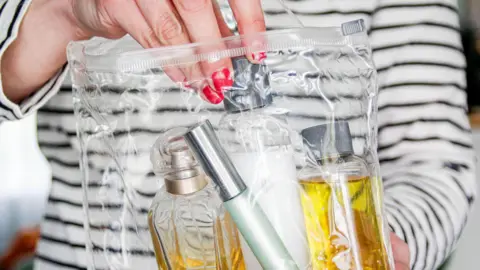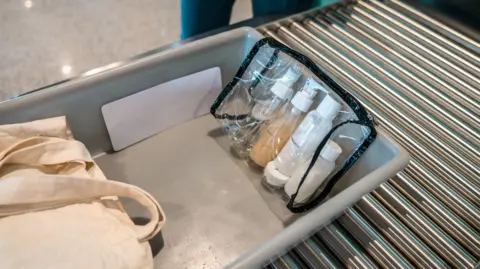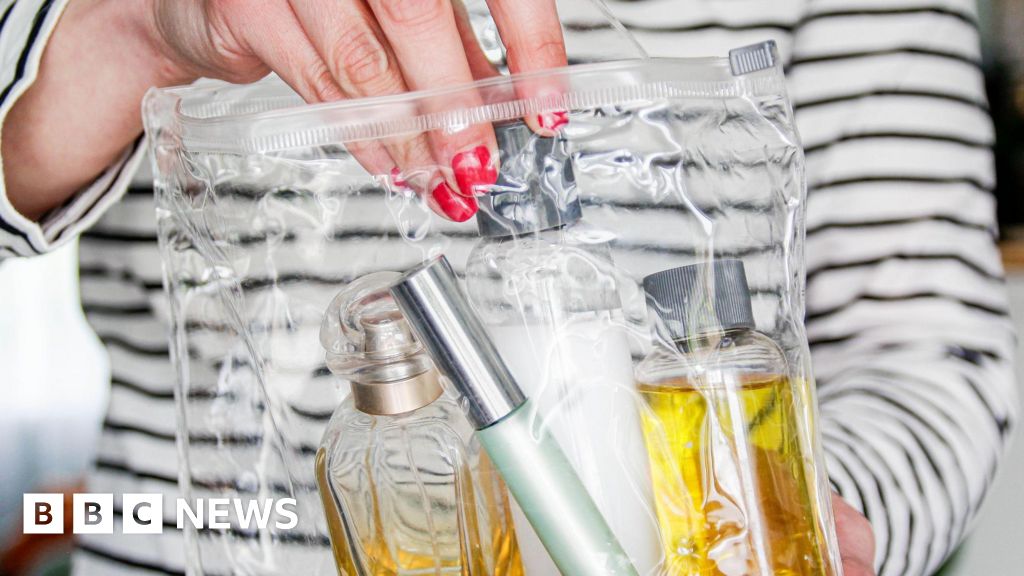 Getty Images
Getty ImagesAir travellers who hoped the era of “tiny toiletries” was nearly over are facing fresh disappointment, as European airports re-introduce strict cabin bag rules.
Some EU destinations had scrapped the 100ml limit for liquids being carried in hand luggage.
But from Sunday, they must all bring it back. It follows a similar move by the UK earlier this summer.
It means if you have been on holiday, you cannot buy a large bottle of suncream, perfume or a local tipple before you get to the airport and expect to carry it home in your hand luggage.
But why has it happened? And will the relaxed rules that had started in some locations ever return?
What is happening in the EU?
Airline passengers around the world had grown used to strict 100ml restrictions on liquids, pastes and gels, which had to be put in a clear plastic bag.
But new scanning machines which use CT X-ray technology should in theory enable larger volumes of liquids to go through, and laptops to stay in bags.
Some EU airports, for example in Rome and Amsterdam, had already put them in place and eased their rules. Most had not yet. Some others have been trialling the new technology.
The Europe branch of the Airports Council International (ACI) estimates around 350 of these scanners are now in use across 13 EU countries such as Germany, Ireland, Italy, Lithuania, Malta, the Netherlands, and Sweden.
However, the EU has reinstated the 100ml limit so a technical issue with the new equipment can be addressed.
In July, ACI Europe criticised the restriction as a “setback for the passenger experience and a blow to major investments made by airports”.
Its director general, Olivier Jankovec, said security was the top priority, but added that those “which have been early adopters of this new technology are being heavily penalised both operationally and financially”.
He also argued that restricting their use “questions the trust and confidence the industry can place in the current EU certification system for aviation security equipment”.
 Getty Images
Getty ImagesWhat happened in the UK?
Predictions that all the UK’s airports would scrap their hand luggage liquid limits this year did not come to pass.
The previous Conservative government had required state-of-the-art scanning equipment to be installed in security lanes by June 2024.
It hasn’t proved that straightforward.
Some regional airports, which have only small numbers of lanes to update, did meet a deadline of June 2024.
However, the likes of Heathrow, Gatwick and Manchester didn’t. Reasons varied from the need for construction work, to supply chain problems. They were given more time to get the new kit in place.
But in mid-June, the Department for Transport suddenly announced 100ml liquids limits must be re-introduced where they had been dropped.
A handful of regional airports needed to swiftly change their processes and airport bosses were angry at the sudden U-turn.
Why has the rule been brought back?
The European Commission announced in late July that the maximum size allowed for individual liquid containers would revert back to 100ml.
There is no date for when the rules will be relaxed again.
The Commission said this wasn’t “in response to any new threat but addresses a temporary technical issue” with the new generation of scanners.
It said it was taking the action “in alignment with the EU’s international partners”, and that “swift technical solutions” would be developed.
The UK government previously said the systems needed improving after new information came to light.
However it has also given no end date for the 100ml limit, so it’s unclear how long the situation will last.
The Department for Transport said it was “working with manufacturers, airports and international partners to lift restrictions when possible.”
So for the foreseeable future it’s best for passengers to assume the old 100ml restrictions apply, and check the rules at both departure and return airports before travelling.


